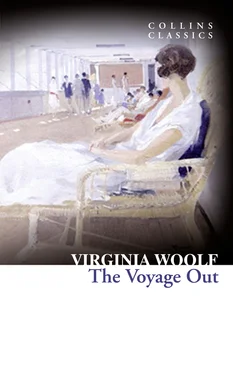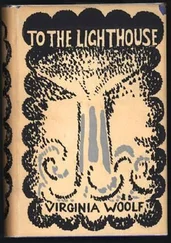“Yes,” Mrs. Ambrose agreed.
That fact, together with other facts, had been made clear by their twenty minutes’ talk, although how they had come to these conclusions they could not have said.
However they were come by, they were sufficiently serious to send Mrs. Ambrose a day or two later in search of her brother-in-law. She found him sitting in his room working, applying a stout blue pencil authoritatively to bundles of filmy paper. Papers lay to left and to right of him, there were great envelopes so gorged with papers that they spilt papers on to the table. Above him hung a photograph of a woman’s head. The need of sitting absolutely still before a Cockney photographer had given her lips a queer little pucker, and her eyes for the same reason looked as though she thought the whole situation ridiculous. Nevertheless it was the head of an individual and interesting woman, who would no doubt have turned and laughed at Willoughby if she could have caught his eye; but when he looked up at her he sighed profoundly. In his mind this work of his, the great factories at Hull which showed like mountains at night, the ships that crossed the ocean punctually, the schemes for combining this and that and building up a solid mass of industry, was all an offering to her; he laid his success at her feet; and was always thinking how to educate his daughter so that Theresa might be glad. He was a very ambitious man; and although he had not been particularly kind to her while she lived, as Helen thought, he now believed that she watched him from Heaven, and inspired what was good in him.
Mrs. Ambrose apologised for the interruption, and asked whether she might speak to him about a plan of hers. Would he consent to leave his daughter with them when they landed, instead of taking her on up the Amazons?
“We would take great care of her,” she added, “and we should really like it.”
Willoughby looked very grave and carefully laid aside his papers.
“She’s a good girl,” he said at length. “There is a likeness?”—he nodded his head at the photograph of Theresa and sighed. Helen looked at Theresa pursing up her lips before the Cockney photographer. It suggested her in an absurd human way, and she felt an intense desire to share some joke.
“She’s the only thing that’s left to me,” sighed Willoughby. “We go on year after year without talking about these things—” He broke off. “But it’s better so. Only life’s very hard.”
Helen was sorry for him, and patted him on the shoulder, but she felt uncomfortable when her brother-in-law expressed his feelings, and took refuge in praising Rachel, and explaining why she thought her plan might be a good one.
“True,” said Willoughby when she had done. “The social conditions are bound to be primitive. I should be out a good deal. I agreed because she wished it. And of course I have complete confidence in you… You see, Helen,” he continued, becoming confidential, “I want to bring her up as her mother would have wished. I don’t hold with these modern views—any more than you do, eh? She’s a nice quiet girl, devoted to her music—a little less of that would do no harm. Still, it’s kept her happy, and we lead a very quiet life at Richmond. I should like her to begin to see more people. I want to take her about with me when I get home. I’ve half a mind to rent a house in London, leaving my sisters at Richmond, and take her to see one or two people who’d be kind to her for my sake. I’m beginning to realise,” he continued, stretching himself out, “that all this is tending to Parliament, Helen. It’s the only way to get things done as one wants them done. I talked to Dalloway about it. In that case, of course, I should want Rachel to be able to take more part in things. A certain amount of entertaining would be necessary—dinners, an occasional evening party. One’s constituents like to be fed, I believe. In all these ways Rachel could be of great help to me. So,” he wound up, “I should be very glad, if we arrange this visit (which must be upon a business footing, mind), if you could see your way to helping my girl, bringing her out—she’s a little shy now,—making a woman of her, the kind of woman her mother would have liked her to be,” he ended, jerking his head at the photograph.
Willoughby’s selfishness, though consistent as Helen saw with real affection for his daughter, made her determined to have the girl to stay with her, even if she had to promise a complete course of instruction in the feminine graces. She could not help laughing at the notion of it—Rachel a Tory hostess!—and marvelling as she left him at the astonishing ignorance of a father.
Rachel, when consulted, showed less enthusiasm than Helen could have wished. One moment she was eager, the next doubtful. Visions of a great river, now blue, now yellow in the tropical sun and crossed by bright birds, now white in the moon, now deep in shade with moving trees and canoes sliding out from the tangled banks, beset her. Helen promised a river. Then she did not want to leave her father. That feeling seemed genuine too, but in the end Helen prevailed, although when she had won her case she was beset by doubts, and more than once regretted the impulse which had entangled her with the fortunes of another human being.
From a distance the Euphrosyne looked very small. Glasses were turned upon her from the decks of great liners, and she was pronounced a tramp, a cargo-boat, or one of those wretched little passenger steamers where people rolled about among the cattle on deck. The insect-like figures of Dalloways, Ambroses, and Vinraces were also derided, both from the extreme smallness of their persons and the doubt which only strong glasses could dispel as to whether they were really live creatures or only lumps on the rigging. Mr. Pepper with all his learning had been mistaken for a cormorant, and then, as unjustly, transformed into a cow. At night, indeed, when the waltzes were swinging in the saloon, and gifted passengers reciting, the little ship—shrunk to a few beads of light out among the dark waves, and one high in air upon the mast-head—seemed something mysterious and impressive to heated partners resting from the dance. She became a ship passing in the night—an emblem of the loneliness of human life, an occasion for queer confidences and sudden appeals for sympathy.
On and on she went, by day and by night, following her path, until one morning broke and showed the land. Losing its shadow-like appearance it became first cleft and mountainous, next coloured grey and purple, next scattered with white blocks which gradually separated themselves, and then, as the progress of the ship acted upon the view like a field-glass of increasing power, became streets of houses. By nine o’clock the Euphrosyne had taken up her position in the middle of a great bay; she dropped her anchor; immediately, as if she were a recumbent giant requiring examination, small boats came swarming about her. She rang with cries; men jumped on to her; her deck was thumped by feet. The lonely little island was invaded from all quarters at once, and after four weeks of silence it was bewildering to hear human speech. Mrs. Ambrose alone heeded none of this stir. She was pale with suspense while the boat with mail bags was making towards them. Absorbed in her letters she did not notice that she had left the Euphrosyne , and felt no sadness when the ship lifted up her voice and bellowed thrice like a cow separated from its calf.
“The children are well!” she exclaimed. Mr. Pepper, who sat opposite with a great mound of bag and rug upon his knees, said, “Gratifying.” Rachel, to whom the end of the voyage meant a complete change of perspective, was too much bewildered by the approach of the shore to realise what children were well or why it was gratifying. Helen went on reading.
Читать дальше












